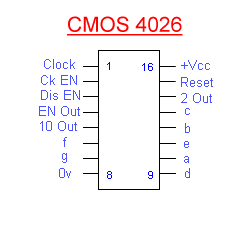Electronic Doorbell with Counter
Description:
This circuit uses a synthesized sound chip from Holtek, the HT-2811. This reproduces the sound of a "ding-dong" chiming doorbell. Additionally, the circuit includes a CMOS 4026 counter display driver IC to count your visitors.
Circuit Notes
The Holtek HT-2811 is available from Maplin electronics in the UK, order code BH69A. The operating voltage must remain within 2.4 to 3.3 Vdc and standby current is minimal. The reset switch zeroes the count,and the 7 segment display is a common cathode type. To save power consumption the display can be enabled or disabled with a switch as shown in the above diagram. The count will still be held in memory. The IC pin out for the 4026 is shown in pin order below:

Pin 1 is the clock input
Pin 2 is the clock enable
Pin 3 is display enable
Pin 4 enables the carry output
Pin 5 is the carry output
Pin 6 is display segment f Pin 7 is display segment g
Pin 8 is 0 V.
Pin 9 is display segment d Pin 10 is display segment a
Pin 11 is display segment e Pin 12 is display segment b
Pin 13 is display segment c Pin 14 is the2 output
Pin 15 is reset
Pin 16 is +Vcc
The envelope of the chime is set by the 220k, 330k, 3u3 and 4u7 resistors and capacitors. These values are the manufactures default values, but may be adjusted to alter the length and delay of the chime.The combination of the 2k2, 22k and 47u resistor capacitor network has a double function. It provides a debouncing circuit for the bell press and at the same time has a sufficiently long time constant. This ensures that anyone rapidly pressing the doorbell switch, only advances the count once.The 47u capacitor may be increased in size, if needed.
Circuit Expansion:
The count may be expanded for up to 99 visits by cascading two CMOS 4026 IC's and using an additional 7 segment display. This is achieved by wiring pin 5 ( the 10's output ) of the first CMOS4026 to pin 1 (the clock input) of the second IC.
Please Note: The CMOS 4026 is availble from Elfa Electronics part number 73-676-42. See my links page also.
Content sourced from Zen Schematics
Circuit:Andy Collinson









